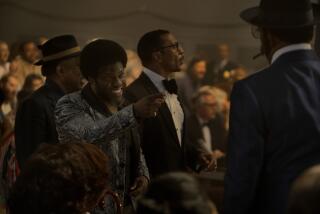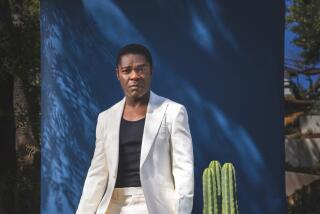Television Review: ‘Memphis Beat’
- Share via
“Memphis Beat,” which premieres Tuesday on TNT, brings us another quirky cop in a city that is neither New York nor Los Angeles. There is probably some equation here, having to do with exoticism multiplied by tax incentives. But I am all for local color, even if, aside from a few establishing shots, the show is actually filmed downriver in New Orleans.
It stars Jason Lee, who spent four seasons in “My Name Is Earl,” and before that was featured in movies by Kevin Smith and Cameron Crowe, and before that was a professional skateboarder. Lee has the rumpled appeal of an unmade bed, which I mean in the nicest way, and this show seems meant to exploit the character he carries within him as much as to create a brand new one for him to inhabit.
He plays Det. Dwight Hendricks, and if I have to tell you he’s a bit of a maverick, you are either a very small child or from some other planet. But if you need this spelled out for you, the writers — Josh Harto created the series with wife Liz W. Garcia ( “Cold Case”) — are happy to oblige: “He may not always do things by the book,” says Dwight’s partner (Sam Hennings), “but I for one have learned to trust him when he’s got one of his feelings.” Check.
The person addressed is Lt. Tanya Rice, the new boss who is not the same as the old boss — she throws out the station’s naked-lady lamp, just for a start — and she is played by Alfre Woodard, possibly the most ill-served actress in America, reckoning the parts she gets against the talent she possesses. Nevertheless, she makes Rice as believable as any human could, and whatever chance the show has to become something more than fuzz on a moldy peach rests on the chemistry the leads are allowed to develop. I do not wholly despair of this happening.
First, of course, they butt heads.
“Det. Dwight Hendricks, the one and only,” Rice says, at their initial meeting. But there is nothing more conventional than an unconventional policeman.
In the pilot, Dwight reluctantly takes charge of a silent, battered old woman, whom he recognizes subsequently as the legendary disc jockey who was the agent of his love for Elvis — whose music he sings in bars — and, if that weren’t enough, the savior of his mental health after the death of his father. “In 1979, I stood outside for 16 hours in the blistering heat just to have her sign a picture for me,” says Dwight, which seems to say either that she was in there for 16 hours or that he arrived at the station 16 hours before her shift began, but which in either case makes no sense.
Anyway, a mystery grows from there. (To solve it Dwight will have to play dolls with a little girl in a treehouse; it is that kind of cop show.) I was somewhat encouraged to see that the villain was not the crazed serial killer of so many pilot episodes but just a garden-variety sociopath, though I’m not sure I would have allowed him his little speech at the end, or his ominous change of accent.
The production occasionally catches something ordinary and real, as when Dwight’s mother (Celia Weston) tells him, “You did such a good job, Dwight, I need to make you a sandwich.” More often it is labored and belaboring, from the eccentric station-house staff — including Abraham Benrubi ( “Men in Trees”), wearing Willie Nelson’s old pigtails, as a Chickasaw desk sergeant, and DJ Qualls as a slack-jawed Cletus of a patrol officer — to the Elvis imitators on the street and Dwight’s constant promotion of Memphis as “sacred ground” to people who, after all, live there too. And it is tonally awkward: In an opening scene unrelated to the later mystery, the police laugh heartily as a suspect’s pants fall down; apparently they forgot the bloody, dead convenience store clerk sprawled over the counter steps away. But I didn’t.
More to Read
The complete guide to home viewing
Get Screen Gab for everything about the TV shows and streaming movies everyone’s talking about.
You may occasionally receive promotional content from the Los Angeles Times.







